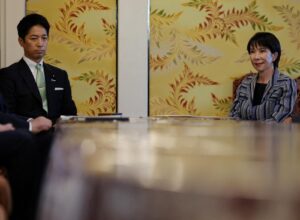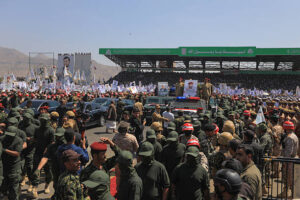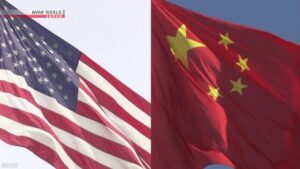The investigations are being undertaken by Treasury officials charged with thwarting attempts by Iran to subvert the UK financial or trade systems to further the Islamic Republic’s ambitions.
Conducted against the backdrop of Israel and America’s bombing campaign to eradicate Iran’s atomic infrastructure, the probes come as the Office for Financial Sanctions Implementation (OFSI), which is part of the Treasury, disclosed that it had last year recorded nine suspected breaches of the UK’s sanctions targeting Iran.
The OFSI’s annual review stated that these sanctions included specific measures aimed at halting the country’s nuclear weapons programme. The document does not disclose the identities of the companies, individuals under suspicion or if these firms are under formal investigation.
However, a Government official told The i Paper that “ongoing analysis and investigations” are being undertaken in relation to the alleged breaches. It is understood that this includes a number of active probes into suspected evasion of the Iran nuclear sanctions measures.
The Government have sought to crack down on sanctions evasion since taking office, setting up the Office of Trade Sanctions Implementation (OTSI), an adjunct to OFSI last year to lead on civil enforcement.
Liam Byrne, chairman of the influential Commons business and trade select committee, said any infringement of sanctions represented a “betrayal of Britain’s interests and values”.
He said: “At a time when we should be uniting to take down the threats posed by Iran — from its nuclear ambitions to its destabilising influence across the Middle East — it is simply unacceptable for Britain to offer backdoors into the global financial system.
“Let’s be clear: UK firms have a duty to act responsibly. This is not a clerical error— it is a question of national security.”
An analysis of the UK’s sanctions regime shows that 190 Iranian, or Iran-linked, organisations and officials are currently the subject of measures including asset freezes, travel bans and director disqualifications on the basis of their alleged involvement with Tehran’s pursuit of nuclear weapons. They include port operators, universities and banks alongside Iran’s armed forces and government ministries.
Several prominent British companies and a dual British-Iranian national have recently found themselves the subject of claims around evasion of US sanctions against Tehran.
Two of the UK’s largest banks – Santander UK and Lloyds Banking Group – were the subject of allegations last year that they had provided accounts to two British front companies secretly owned by a sanctioned Iranian petrochemicals producer based near Buckingham Palace which Washington accuses of raising hundreds of millions of dollars for the Iranian Revolutionary Guard Corps (IRGC).
Standard Chartered has been subject to legal claims it breached US sanctions against Iran (
The Financial Times reported that accounts hosted by Santander and Lloyds were used to move money around the world as part of a vast sanctions-busting scheme. The UK front companies, one of which was registered to a detached home in Surrey, were alleged to have been used to receive money from other Iranian front companies in China, which is the leading purchaser of Iranian oil products.
Both Santander and Lloyds strongly denied any wrongdoing and said they believed they had not breached any US sanctions. When approached by The i Paper this week, both companies said they were not aware of any UK Government investigation into the claims.
A Lloyds Bank spokesperson said of the allegations: ‘We are confident that we have met all legal and regulatory obligations and, based on our own investigation, we do not believe we have breached any sanction requirements’.
A Santander spokesperson declined to comment.
The episode serves to highlight the regulatory risks faced by financial institutions in the face of Iran’s well-documented desire to subvert the Western banking system to launder oil money, ultimately destined for the country’s intelligence agencies and clandestine programmes.
Standard Chartered, another British bank, is currently the subject of a £1.5bn lawsuit in the High Court alleging that historic breaches of Iran sanctions, for which it has been previously fined, were more widespread than previously understood.
Investors accuse the bank of issuing misleading statements about its compliance with American sanctions on Iran – a claim which it denies. In 2019, Standard Chartered agreed to pay $1.1bn (£800m) to the US authorities to settle charges that it had breached sanctions and ignored red flags about Iran-linked customers.
The bank said it considered the High Court lawsuit to be “without merit” and said it would “vigorously defend” the claims against it.
AnalysisIran’s regime is at crisis point — why what happens next should worry the West
A Standard Chartered Spokesperson of the lawsuit: “This filing is another attempt to use fabricated claims against the bank, following previous unsuccessful attempts. The false allegations underpinning it have been thoroughly discredited by the US authorities who undertook a comprehensive investigation into the claims and said they were ‘meritless’ and did not show any violations of US sanctions. We are confident the courts will reject these claims, as they have already done repeatedly.”
The US Treasury Department earlier this month announced sanctions against more than 30 individuals and entities who it said were part of a “shadow banking” network responsible for laundering billions of dollars through the global financial system. It said the network was used by the Tehran regime to move money from oil sales which was in turn used to “fund its nuclear and missile programmes and support its terrorist proxies”.
A Government spokesperson said: “We are committed to ensuring that sanctions are robustly enforced, potential breaches investigated and appropriate action taken.”




